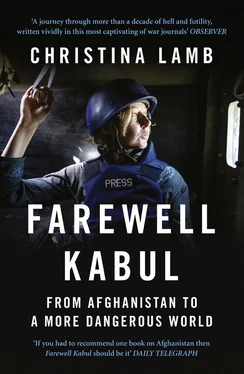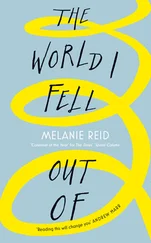1 ...6 7 8 10 11 12 ...16 When the US bombing started across the border there were riots in Quetta, and anything perceived as Western was attacked. In Quetta this was not a lot – basically the cinema and the HSBC bank, which had its cashpoint ripped out of the wall, causing untold inconvenience to us correspondents, as it was the only one. The protests gave ISI an excuse to lock us in the hotel altogether, on the grounds that it was too dangerous for us to venture out.
I kept thinking of what Karzai had told me about Pakistan. Before we were locked in I managed to go to the frontier town of Chaman, where I met a chief of the Achakzai tribe, whose people lived on both sides of the border and controlled the smuggling routes in and out. He told me that trucks coming from the National Logistics Company of Pakistan’s army, supposedly transporting flour, were actually full of weapons for the Taliban.
Nine days into the bombing, on 16 October, a second CIA team, Team Alpha, arrived in Afghanistan, joining General Abdul Rashid Dostum in the northern city of Mazar-i-Sharif. The choice caused consternation among the Northern Alliance leadership. The whisky-loving Uzbek and his feared Jowzjan militia were notorious for atrocities, such as driving over prisoners with tanks, and had fought alongside the Soviets during the jihad, fighting pitched battles against Ahmat Shah Massoud’s forces. Dostum switched over to the mujaheddin in 1992 when the fall of the Soviet-backed President Mohammad Najibullah was imminent, and had only recently linked up with the Northern Alliance. In their view he was not to be trusted. They thought the CIA team should have been placed with their long-time commander Mohammad Ustad Atta, Dostum’s rival for control of the city.
The first US military to set foot in Afghanistan was special forces team ODA 555, codenamed ‘Triple Nickel’, which was flown in from Uzbekistan and landed on the Shomali plains north of Kabul on 19 October to join Marshal Fahim and his CIA advisers. The following day a second special forces team, ODA 595, joined General Dostum in the northern city of Mazar-i-Sharif. A third group was dropped south of Kandahar. Using SOFLAMs, they laser-guided bombs from US fighter jets onto Taliban targets with such precision that Dostum bragged on the radio to Taliban that he had a ‘death ray’. They also attempted to organise the Afghan fighters, and were joined by SAS and some Australian special forces.
Back in Quetta, the nights had started to chill. We had all grown tired of the nightly lamb barbecue and fresh apple juice in the orchard. American newspapers were already talking of quagmires. It felt as if we might be there for a long time.
One day, shortly after the bombing had started, I knocked at Karzai’s door to be told by his assistant, Malik, that he had gone away.
‘Where has he gone?’ I asked.
‘Karachi,’ he replied.
Malik was not a good liar. ‘He’s gone to Afghanistan, hasn’t he?’ I said.
Karzai had told me he’d been planning to go to southern Afghanistan to try to raise support. I’d begged him to take me along. ‘Taking you inside is as easy as cracking this nut,’ he had said, holding up an almond. ‘The problem is what to do then.’
He’d always felt insecure about the fact that he hadn’t actually fought in the jihad. The only time he had gone inside Afghanistan during the war against the Russians was our trip to Kandahar in 1988. If he was going to play an important role in whatever government replaced the Taliban, he needed to prove his bravery. Also, Pakistan had cancelled his visa, so if he stayed in Quetta he could be arrested.
His intention was to go and rally the southern tribes against the Taliban. He seemed to think this would be quite easy. I couldn’t help remembering our own trip to Kandahar, and the way we kept almost being bombed by the Russians as he naïvely broadcast his presence everywhere by radio. Now he was heading into the Taliban’s own backyard.
Ahmed Wali said he’d tried to dissuade him, but to no avail. One day Karzai told his wife he was going to visit some relatives near the border, and to pack him a toothbrush. ‘If I don’t come back after two days forget about me,’ he had said.
He’d set off on a second-hand motorbike, accompanied by a few trusted elders. He had asked for help from the CIA, meeting with his case officer ‘Casper’ in Islamabad. They thought his mission was crazy, so provided him only with a satellite phone and an emergency phone number. He was so poorly equipped that he had to send someone back out to Ahmed Wali in Quetta on a motorbike with the phone batteries for charging.
Over in the east, another old friend from the jihad days had gone into Afghanistan with the same idea. Abdul Haq had been the main mujaheddin commander in the Kabul area during the Russian occupation, and had lost his right foot to a landmine. Like Karzai he was a long-time critic of ISI. He had kept fighting, but eventually left Peshawar for Dubai after his wife and son had been killed there in 1999 – he believed by ISI. After 9/11 he returned to Peshawar and began renewing his old mujaheddin networks. While Karzai headed west, Abdul Haq gathered supporters to head into his home area of eastern Afghanistan around Jalalabad, where his family were very influential, and planned to start a Pashtun uprising against the Taliban.
A charismatic man with twinkling eyes, Abdul Haq always liked to talk. Back in the eighties I had spent many afternoons with him in his house in Peshawar, eating pink ice cream and listening to his stories of the war and why it was going wrong. Predictably, he had told journalists of his plans before setting off over the border on 21 October with his nephew Izzatullah and seventeen men, mostly veterans of the jihad. They had travelled in pick-ups, crossing the border the old way near Parachinar, stopping for the night under the stars, sleeping under Orion and the Milky Way.
It was hard for Haq to walk far over the rugged mountains because of his artificial foot, so the next morning they mounted horses in Jaji, near where bin Laden used to have a camp. They rode through the Alikhel gorge, which had been a favourite spot for ambushing Soviet convoys. But just as their own forces had cut off that road in the past, they soon found themselves cut off by the Taliban, and in the midst of a firefight.
As the bullets were flying, Izzatullah ducked behind a rock and managed to make a call to the US on the satellite phone. He telephoned Bud McFarlane, a retired CIA agent who had been a long-time backer of his uncle. McFarlane contacted the Agency headquarters at Langley, Virginia. But they could do nothing, and the men were captured and taken to Jalalabad.
On 26 October we got the news that Haq had been executed. He was forty-three. I was horrified. He seemed to me to have been one of the genuinely good people, and someone who might have been critical for Afghanistan’s future. His friends believed he had been betrayed by ISI.
I was worried about Karzai.
Frustrated by not being able to report freely in Quetta, I flew to Karachi to meet Mufti Nizamuddin Shamzai, a cleric close to Mullah Omar and the Taliban who headed the Banuri complex, the city’s largest madrassa. Some said it was he who had first introduced Mullah Omar and bin Laden. He laughed at the idea that Pakistan had stopped supporting the Taliban. He had personally declared a fatwa against the US.
The evening I returned to Quetta I went to Ahmed Wali’s house. We spoke to Karzai on the satellite phone, and he told me some of the things he had seen crossing the border. I got back to the Serena just before the 9 p.m. curfew, planning to write my story for my paper the next day.
I am lucky to sleep well even in war zones, and was deeply asleep when around 2 a.m. I was woken by pounding on my door. Through the spyhole I could see the hotel’s duty manager with a group of five men. Wearing grey shalwar kamiz and aviator glasses even at night, they were instantly identifiable as ISI.
Читать дальше












